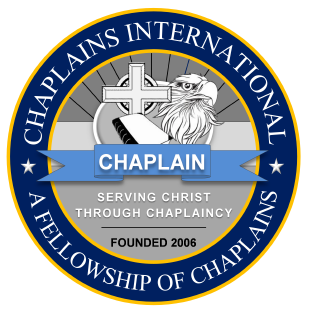
Your Order
Thank you for your purchase!
CI Basic Chaplain Training (BCT) Certification
Course Specifications
Course Number:
CIBCT001
Course Length:
20-Weeks
Price:
6 payments x $60.00 = $360.00
Course Description:
The CI Basic Chaplain Training (BCT) Certification program is tailored for those on the path to chaplaincy. Crafted by Chaplain Scadron, an esteemed Angelus Bible Institute alumnus with a Theology Doctorate and a Divinity Doctorate, this enhanced program provides an in-depth look at chaplaincy basics. It addresses key areas such as chaplain duties, ethical guidelines, and the nuances of delivering spiritual support in varied environments.
Exploring the intricate nature of chaplaincy, this course examines the shifting dynamics and prospects in the field, aiming to arm future chaplains with the essential knowledge and abilities to perform effectively, regardless of the setting—be it in healthcare, the armed forces, the corporate world, or community initiatives. It underscores the significance of empathy, ethical conduct, and compassion, which are foundational to the support offered by chaplains.
Marked by its comprehensive content, practical wisdom, and clear presentation, this certification course is a critical resource for individuals aspiring to make a deep, positive impact in chaplaincy. Beyond preparing students for certification, it fosters a deep vocational commitment and equips them to meet the spiritual needs of those they'll assist, upholding the utmost care and professional standards.
Course Objectives:
Upon successful completion of this course, you will be able to:
- Understand Chaplaincy Fundamentals: Gain a solid understanding of the basic principles of chaplaincy, including the roles and responsibilities inherent to the profession.
- Ethical Considerations: Learn the ethical guidelines and considerations critical to chaplaincy, ensuring the provision of care is conducted with integrity and respect for all individuals.
- Practical Spiritual Care: Develop skills in offering practical and effective spiritual care across diverse settings, from healthcare and military to corporate and community environments.
- Navigate Complexities: Explore the complexities and evolving dynamics of chaplaincy, including challenges and opportunities, to adapt and serve effectively in a changing world.
- Cultivate Compassion and Empathy: Emphasize the development of compassion and empathy, essential qualities for providing supportive and meaningful spiritual care.
- Professional Development: Prepare for professional growth and certification in chaplaincy, focusing on acquiring the knowledge and skills necessary for successful practice.
- Vocational Commitment: Instill a deep sense of vocational calling, reinforcing the commitment to meet the spiritual needs of individuals served, in line with high standards of care and professionalism.
Target Student:
The target student for the CI Basic Chaplain Training (BCT) Certification course includes individuals aspiring to enter the field of chaplaincy with a dedication to providing spiritual and emotional support across various settings. This encompasses:
- New entrants to chaplaincy seeking foundational knowledge and skills.
- Professionals in healthcare, military, corporate, or community sectors desiring to integrate chaplaincy into their current roles.
- Individuals with a strong commitment to ethical practices, compassion, and empathy looking to make a meaningful impact through spiritual care.
- Those interested in professional development and certification in chaplaincy to enhance their ability to serve effectively in diverse environments.
- Persons with a background in spiritual, pastoral, or theological studies aiming to apply their knowledge in practical chaplaincy settings.
Prerequisites:
The prerequisites for the CI Basic Chaplain Training (BCT) Certification course typically includes:
- Educational Background: A high school diploma or equivalent; some programs may require or prefer a bachelor's degree or coursework in theology, pastoral care, psychology, or related fields.
- Personal Qualities: Demonstrated qualities of compassion, empathy, and a genuine desire to support others spiritually and emotionally in various settings.
- Ethical Integrity: A commitment to uphold ethical standards and practices within chaplaincy and spiritual care.
- Foundational Knowledge: Basic understanding of spiritual care practices, although detailed knowledge of chaplaincy is not required as this will be covered in the course.
- Communication Skills: Effective communication skills, both verbal and non-verbal, to interact sensitively and effectively with diverse individuals and groups.
- Commitment to Learning: A readiness to engage in both theoretical learning and practical training aspects of chaplaincy.
- Physical and Emotional Stability: The ability to handle the emotional and sometimes physical demands of chaplaincy work, including providing support in crisis situations.
Course Content
- Lesson 1: Overview of Industrial Chaplaincy
- Lesson 2: So, You're Going to Prison?
- Lesson 3: Hospital Chaplaincy
- Lesson 4: Hospice Care Chaplaincy
- Lesson 5: Duties of the EMS Chaplain
- Lesson 6: Emergency Protocols
- Lesson 7: Pastoral Confidentiality and Ethics
- Lesson 8: Dealing with Suicidal People
- Lesson 9: Death Notifications
- Lesson 10: Biblical Counseling 101
- Lesson 11: The Building Blocks of Counseling
- Lesson 12: Gathering Information
- Lesson 13: Personal Assessment Forms
- Lesson 14: Biblical Process of Change
- Lesson 15: Critical Situational Stress
- Lesson 16: Traumatic Stress and Children
- Lesson 17: Grief and Bereavement
- Lesson 18: Preaparing for Approaching Death
- Lesson 19: Healing Conversations
- Lesson 20: The Chaplaincy Final Examination